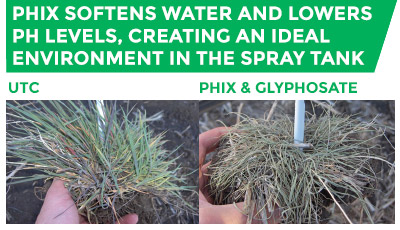Water Hardness and Desiccation
Earlier this season, we examined how hard water can impact your burn-off and in-season spraying. The impact of hard water doesn’t end there – it can also affect crop desiccation later in the season.
Hard water and high pH levels tend to go hand-in-hand; if water for tank-mixing desiccants is very hard chances are it also has a high pH level. These two factors will reduce the efficacy of the herbicide and this can result in slower drying times for your crops and a delayed harvest.

Hard water has high mineral content, especially minerals containing iron, calcium, magnesium, manganese and zinc. The positively charged ions found in these minerals can bind to the negatively charged ions in glyphosate and other herbicides, significantly reducing their effectiveness. High levels of calcium and magnesium can also boost the water’s pH level, increasing its basicity, but many herbicides require more acidic conditions to work effectively.
If your water tests reveal that you’ve got hard water with a high pH level, you’ll want to correct that before you tank-mix with glyphosate or another herbicide for desiccation. I recommend effectively treating hard water by using a water conditioner like OMEX’s pHix.
Traditional spray water has a hardness level around 100-800 ppm. pHix lowers water hardness levels to below 50 ppm, creating an ideal environment for maximum herbicide efficacy inside the spray tank. pHix is developed with stabilized sulfur, which improves water quality by causing calcium-containing minerals like gypsum to precipitate out of the water.
When it comes to pH levels, I’ve seen that pHix is much more effective at lowering spray tank pH volume compared to Ammonium Sulphate, a common water conditioner. pHix’s acidic nature lowers the pH of your spray solution to 2.5 – 3.5, providing the acidic conditions many herbicides need.
Not only is lowering water’s pH good for herbicide efficacy, it also protects soil. Continuous spraying of high pH water can lead to higher pH levels in the soil, potentially creating problems for future growing seasons.
As we approach the time for crop desiccation, consider how a water conditioner can help you get to harvest faster by softening spray water and lowering its pH levels. Talk to your OMEX representative today to learn more about pHix and how it can improve crop desiccation.
